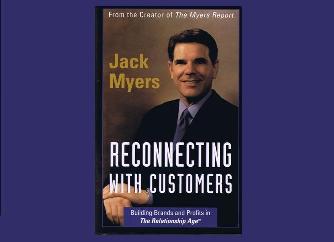In Tough Economic Times, Marketers Reconnect to Marketing's Core Purpose: Classic Jack

This Classic Jack commentary is excerpted from Jack Myers’ 1998 book: Reconnecting with Customers: Building Brands and Profits in The Relationship Age.® It’s especially relevant in these times of economic turmoil.
In times of great change and upheaval, marketers will reconnect to the core purpose of their advertising spending: to build better relationships with customers and to generate sales.
To accomplish this, they will forge relationships with media, agencies, and researchers who are equally committed to this same process. Marketers’ objectives are shifting progressively away from traditional cost efficiency-based criteria and they are shifting away from purely information based decision-making. In their place, marketers are placing increased emphasis on value, results, and relationship based decision-making.Rather than focusing on the past for their decisions, these innovative thinkers are focusing on innovative visions of a future that embraces new media and new ways of connecting with customers.
The Internet will experience the greatest benefit from this tendency by marketers to seek media that can demonstrate a stronger relationship with their customers.
Change in the world of media, advertising, and marketing is accelerating more rapidly than in other industries because of three factors and one piece of technology. The three factors are.
1. The growth in the number and popularity of alternative media channels.
2. The introduction of new media and the resulting new avenues for communications, as well as the many new skills needed to implement effective new media applications. This causes the former power players in the business who are not computer savvy or even able to understand the impact of new media to become fearful of their roles and their power in the world of computer-based communications.
3. The long-standing refusal of the former powers to acknowledge that their role and the role of their companies are eroding, and who thus fail to adjust, missing a chance to retain a larger portion of their former power.
The technology that had the most impact was not the computer, but instead was the simple remote control. The remote so greatly reduced the effort necessary for change (the effort required to get up and move across the room to change the TV channel), that viewers began to experiment and discover alternatives to the traditional three-network programming fare. Once discovered, viewers no longer responded to the networks’ practice of scheduling to the lowest common denominator with least objectionable programming(a practice introduced in the 1970s by NBC research and programming executive Paul Klein). Instead they sought out the most desirable programming, constantly zapping and surfing for programming they preferred.Consumers’ search for the most desirable programming and content across new media platforms will accelerate, leading to new loyalties and new relationships.(Editor’s Note: Remember this was written in 1998.)
In this environment it is challenging for television networks - or any medium - to generate strong bonds of loyalty among audiences. But when, after years of disconnect, new relationships are formed and audiences’ expectations from these relationships are consistently fulfilled, these new bonds will become exceptionally strong and highly valued. In order to take advantage of this trend, marketers are beginning to adjust and to shift their advertising budgets to those media that can demonstrate a stronger relationship with audiences and away from those that offer only marginal relationships with audiences.
The Media Agewas created by the introduction of the television, and the age lasted, relatively intact, for more than fifty years. The New Media Age, marked by the development of the remote control and the expansion of the Internet, is radically altering the marketplace and resulting in Isoquantic changes in relationships among media, consumers, and advertisers.
About Jack Myers:For more than two decades, Jack Myers has been the media industry’s leading analyst, researcher and advisor on relationships among marketers, agencies and media sellers, providing business development services and custom insights on relationship best practices to more than 200 marketers, agencies, media companies and industry service providers. Jack can be reached at jm@jackmyers.com.
To obtain a full copy of The Relationship Ageseries or to discuss Jack’s consulting and advisory services, contact jm@jackmyers.com.


